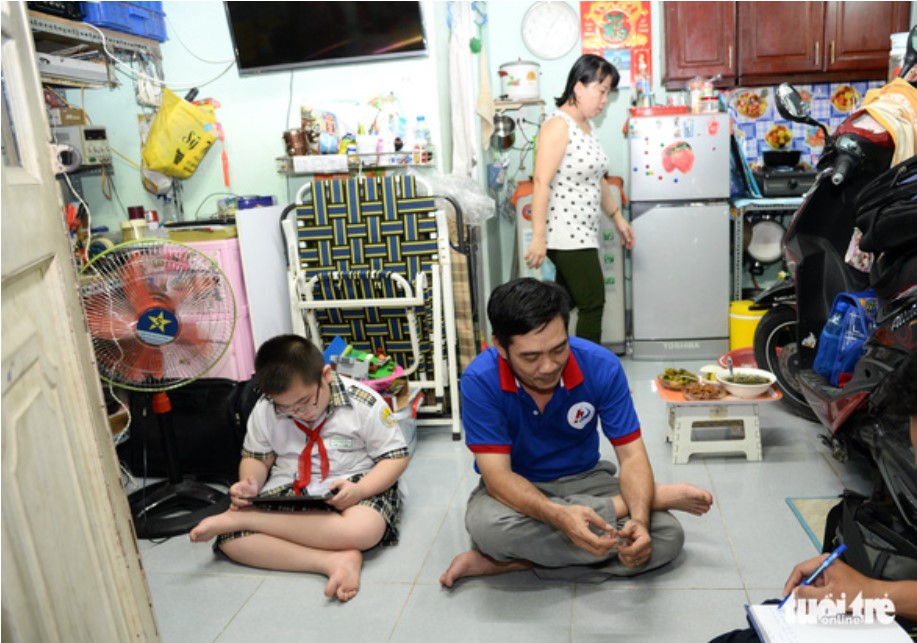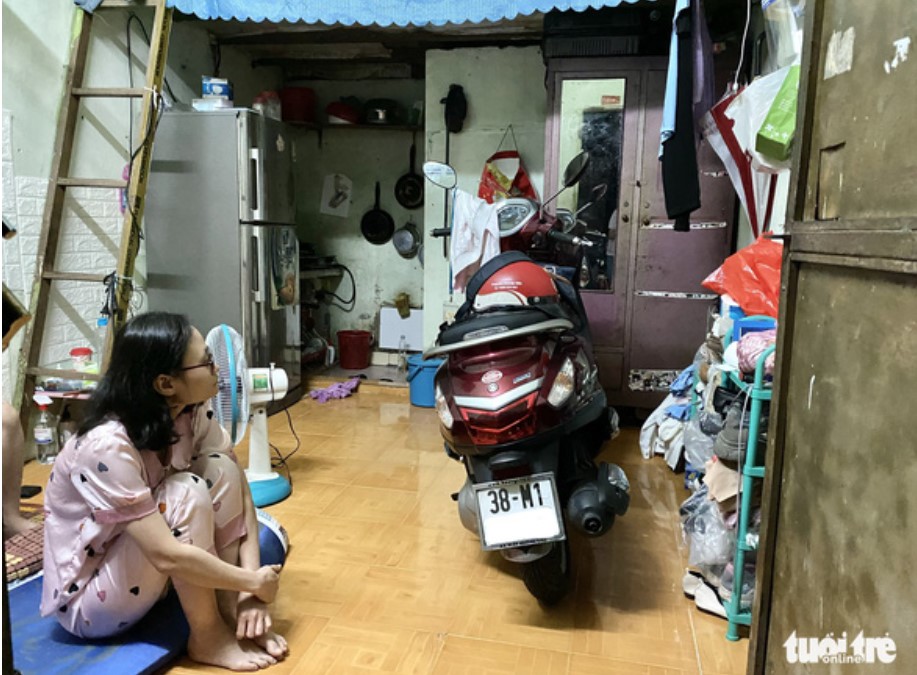Owning a small apartment or house in a city like Ho Chi Minh City is a distant dream for many young workers, as availability and high prices leave home ownership out of reach.
House prices in most Vietnamese cities have been rising steadily for many years, especially in metropolises like Ho Chi Minh City.
Research by Tuoi Tre (Youth) newspaper shows that the city has run out of affordable housing, leaving some joking that it has 'died out.'
Super-small living spaces
In a shelter with an area of only nine square meters on Huynh Tan Phat Street in District 7, live three tenants, including a woman who is five months pregnant.
At 4:00 pm, Tran Thien Khang, the only man in this rented unit, comes home from work with a bag of meat and a bunch of vegetables, the ingredients for dinner.
"This place is not only convenient, but also close to where my wife and her mother work," Khang says of its advantages.
The metal-roofed unit is divided into three separate areas for sleeping, cooking, and bathing.
Because of the limited space, all sorts of things are hung up so the four walls all around are crammed with most of their belongings.
Despite the inconvenience, the monthly rent of only VND1.4 million (US$61) or VND1.6-1.7 million ($70-74) including electricity and water bills makes the rented house a good choice for Khang's household.
The couple sent their first daughter to live with her grandparents and moved into this unit while the woman is expecting their second child.
Their house is one of more than 10 units in a working-class neighborhood.
A small passageway runs between two rows of shelters and is just wide enough for a motorbike.
The limited space forces the only fan in the room to always run on high to make the three people a little more comfortable on hot days.
According to the 2020 Residence Law, eight square meters of space is the minimum requirement to register as a temporary tenant.
Khang's space is not even half the minimum area.
Another tenant, Phan Thi Tinh, who shares a 15-square-meter room with two other roommates, lives in a larger place than Khang’s in Binh Chieu Ward, Thu Duc City.
Her room, which is big enough for her and two motorbikes, is rented at a price of VND1.8 million ($78) a month.
The rent is quite low after they split it among themselves.
As workers, they often stay at the factory for 10 hours a day and only come home at night to sleep.
|
|
| Phan Thi Tinh sits in her small apartment shared with two other roommates. Photo: Dieu Quy / Tuoi Tre |
Poverty-stricken workers
Given Tinh's low salary, it is understandable why she chose such a place.
Since she cannot ride a motorbike, she rides her bicycle to the factory every day.
Since 2020, she has been working in a shoe factory in Ho Chi Minh City with a monthly salary of about VND6.5-6.7 million ($283-292), including allowances.
Her income can be increased a little, to VND7.5-8 million ($326-348), if she gets more shifts.
"I have to spend the money so sparingly that it is enough for one month, sometimes I have to borrow from others," the worker said.
After spending the money on rent and food, she uses the rest for medicine, household items, and necessary feminine hygiene products.
Despite her meager salary, Tinh tries to send VND1 million ($44) to her mother, who lives in her hometown in the north-central province of Ha Tinh.
"I live alone and try my best to save up some money," she added.
"If I have some money left over, I do not dare to spend it, but save it in case I get sick, go to a wedding or have other emergencies."
Tinh is among those workers whose monthly income is less than VND10 million ($440), forcing them to live in cramped conditions.
Trying to make ends meet, like Tinh's situation, is not uncommon.
Khang works as a motorbike taxi driver for a ride-hailing app. He earns about VND400,000 ($17) from seven hours of work from 11:00 pm to 6:00 am every day.
These days, his income has shrunk due to higher gasoline prices.
Khang and his mother-in-law also choose to eat less so that his wife, who is pregnant, can eat more healthy food during this difficult time.
The low income makes the dream of owning a home a utopian one for workers like Tinh and Khang.
They dare not dream of having an apartment
"We do not even have our own clean toilet in Ho Chi Minh City, it's unimaginable to think of a proper apartment," Khang says, shaking his head sadly as he talks to a Tuoi Tre reporter.
He and his wife are just trying to work so they can stay in the city.
Despite many obstacles, Ho Chi Minh City is a place that offers them the opportunity to have enough money to raise their children in the long run.
The more migrant workers come to Ho Chi Minh City, the fewer affordable houses there are.
Many of them have given up the dream of owning a home because prices are constantly rising.
Not only blue-collar workers but also many white-collar workers cannot afford a house in the city these days.
Tran Van Nguyen, an employee of a real estate company with a monthly salary of more than VND15 million ($653), still lives as a tenant in an apartment, although he has dreamed of owning his own home since his days as a student.
According to Nguyen, living expenses account for half of his monthly income, and even though prices continue to rise, his salary remains the same.
"I have only been able to return to work in the last two months after being unemployed for several months because of the COVID-19 pandemic," Nguyen said.
"Now I even have to carefully factor in the cost of living.
"Although I did my best and worked hard, what I get is just enough for my living expenses, and a little is left over."
Like us on Facebook or follow us on Twitter to get the latest news about Vietnam!




















































